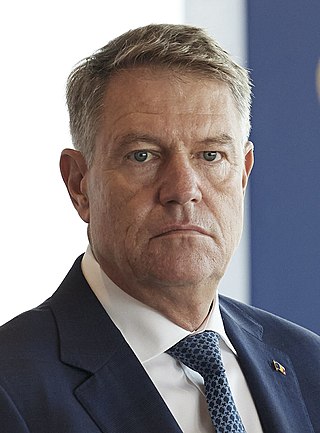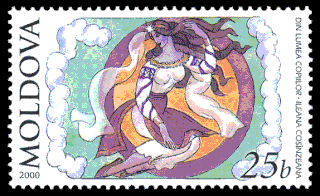Iohannis is both a surname and a given name. Notable people with the name include:
Cristina is a female given name, and it is also a surname. Notable people with the name include:
Klaus is a German, Dutch and Scandinavian given name and surname. It originated as a short form of Nikolaus, a German form of the Greek given name Nicholas.

The National Liberal Party is a Christian democratic and socially conservative political party in Romania. Re-founded in mid January 1990, shortly after the Revolution of 1989 which culminated in the fall of communism in Romania, it claims the legacy of the major political party of the same name, active between 1875 and 1947 in the Kingdom of Romania. Based on this historical legacy, it often presents itself as the first formally constituted political party in the country and the oldest of its kind from the family of European liberal parties as well.

Klaus Werner Iohannis is a Romanian politician, physicist, and former physics teacher who has been serving as the fifth president of Romania since 2014.
Johannes is a Medieval Latin form of the personal name that usually appears as "John" in English language contexts. It is a variant of the Greek and Classical Latin variants, itself derived from the Hebrew name Yehochanan, meaning "Yahweh is gracious". The name became popular in Northern Europe, especially in Germany because of Christianity. Common German variants for Johannes are Johann, Hannes, Hans, Jens and Jan. In the Netherlands, Johannes was without interruption the most common masculine birth name until 1989. The English equivalent for Johannes is John.

Ileana is a female given name. It is the feminine form of the male name Elijah. It has been adapted for Romanian, Bulgarian, Macedonian, Italian and Spanish. In Romanian it is a form of the name "Helen", and a hypocoristic for Ileana is Nuţi. In Romanian mythology, Ileana Cosânzeana is a mythological feminine figure represented as a beautiful good-natured princess, embodying the concept of feminine beauty. Ileana or Illeana may refer to:

The Order of the Star of Romania is Romania's highest civil Order and second highest State decoration after the Order of Michael the Brave. It is the oldest Order of Romania. It is awarded by the President of Romania, and has six grades, from lowest to the highest: Knight, Officer, Commander, Grand Officer, Grand Cross, and Grand Cross with Collar.

The Székely Land (Szeklerland) is a historic and ethnographic region in Eastern Transylvania, in the center of Romania. The primary goal for the Hungarian political organisations in Romania is to achieve Székely autonomy. The Szeklers make up about half of the Hungarians in Romania and live in a compact ethnic bloc. According to official data from Romania's 2011 census, 609,033 persons in Mureș, Harghita, and Covasna counties consider themselves Hungarian. The Székelys (Szeklers), a Hungarian sub-group, are mainly concentrated in these three counties.

Dacian Julien Cioloș is a Romanian agronomist who served as Prime Minister of Romania from November 2015 to January 2017. He previously served as Agriculture Minister under Călin Popescu-Tăriceanu between October 2007 and December 2008. In November 2009, European Commission President José Manuel Barroso nominated him to be the next Agriculture Commissioner, a position he assumed in February 2010 and held until his term expired in November 2014. In November 2015, President Klaus Iohannis named him prime minister; Cioloș assumed office after receiving approval from Parliament.

Presidential elections were held in Romania in 2014. They were the seventh presidential elections held in post-1989 Romania. In the first round of the elections on 2 November, the top two of the fourteen candidates qualified in a run-off on 16 November. These candidates were Victor Ponta, former Prime Minister and ex-leader of the Social Democratic Party (PSD) who won around 40% of the vote in the first round, and Klaus Iohannis, then mayor of Sibiu and leader of the Christian Liberal Alliance (ACL), who won around 30% in the first round respectively. Following large protests on how Ponta's government organized the elections in the diaspora, Klaus Iohannis staged a surprising come-back and won the run-off with 54.5%, or more than a million votes than his contender.
Joannis is a given name. Notable people with the name include:
The Fourth Ponta Cabinet was the government of Romania from 17 December 2014 to 17 November 2015. The Cabinet was supported by the Social Democratic Party (PSD), the National Union for the Progress of Romania (UNPR) and the Alliance of Liberals and Democrats (ALDE), the alliance forged by Călin Popescu-Tăriceanu's Liberal Reformist Party (PLR) and Daniel Constantin's Conservative Party (PC). Fourteen of the ministerial portfolios were held by PSD members, three by ALDE, two by UNPR and two by independent members.

Sorin Mihai Cîmpeanu is a Romanian politician who served as Minister of Education in Ciucă Cabinet. He had previously held the same position in Ponta IV and Cîțu cabinets, and, between 5 and 17 November 2015, acted as Prime Minister of Romania, after President Klaus Iohannis accepted Prime Minister Ponta's resignation. Klaus Iohannis's appointment of Sorin Cîmpeanu was just a stopgap measure until a new candidate for the post was selected.

The 2015 Romanian protests began on 3 November, when more than 15,000 people protested in front of Victoria Palace—the headquarters of the Romanian government—blocking traffic in Victory Square.

There were numerous protests against the Romanian Government between 2017 and 2019. In January 2017, days after the government of the Grindeanu Cabinet was sworn into office in Romania, protests took place throughout the country against ordinance bills that were proposed by the Romanian Ministry of Justice regarding the pardoning of certain committed crimes, and the amendment of the Penal Code of Romania. At the heart of these protests is the community Corruption Kills, founded by Florin Bădiță, who alongside other civic groups organized what proved to be the largest protests since 1989, thus realizing the "Revolution of our generation".
A consultative referendum took place in Romania on 26 May 2019, on the same day as the European Parliament elections, about whether to prohibit amnesties and pardons for corruption offences, as well as whether to prohibit the Government from passing emergency ordinances concerning the judiciary and to extend the right to appeal against them to the Constitutional Court. Both proposals were approved by wide margins.
The COVID-19 pandemic in Romania is part of the ongoing pandemic of coronavirus disease 2019 caused by severe acute respiratory syndrome coronavirus 2. The virus was confirmed to have reached Romania on 26 February 2020, when the first case in Gorj County was confirmed.
This article documents the timeline of the COVID-19 pandemic in Romania.
During the COVID-19 pandemic, Romania has supported Moldova on several occasions, supplying it with medical equipment and supplies, volunteer Romanian experts and doctors and even a series of COVID-19 vaccine units that arrived on 27 February 2021, which allowed Moldova to start its vaccination program.
A political crisis began on 1 September 2021 in Romania, engulfing both major coalition partners of the Cîțu Cabinet, namely the conservative-liberal National Liberal Party (PNL) and the progressive-liberal Save Romania Union (USR). The crisis also involved former prime minister Ludovic Orban (PNL), who was set to face Prime Minister Florin Cîțu (PNL) in a leadership election during the party congress on 25 September, with the latter eventually replacing the former. Orban would eventually resign from his position as President of the Chamber of Deputies, with him and his supporters subsequently splitting from the PNL, in order to form the Force of the Right (FD).